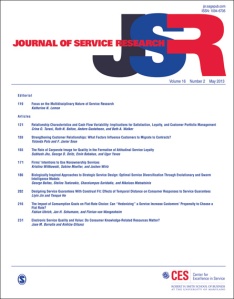What Effect Does Status Endowment Have on Customer Loyalty Programs?
 [We’re pleased to welcome Lena Steinhoff of the University of Paderborn in Germany. Dr. Steinhoff recently collaborated with Andreas Eggert of University of Paderborn and Ina Garnefeld of the University of Wuppertal on their paper from Journal of Service Research entitled “Managing the Bright and Dark Sides of Status Endowment in Hierarchical Loyalty Programs.”]
[We’re pleased to welcome Lena Steinhoff of the University of Paderborn in Germany. Dr. Steinhoff recently collaborated with Andreas Eggert of University of Paderborn and Ina Garnefeld of the University of Wuppertal on their paper from Journal of Service Research entitled “Managing the Bright and Dark Sides of Status Endowment in Hierarchical Loyalty Programs.”]
When I opened the envelope and found a golden customer card issued by a hotel chain that I had hardly patronized, I was surprised and had some mixed feelings about it, which is how this research project began. Indeed, service companies purposefully offer elevated status to some customers who do not meet the required spending level, in an attempt to profit from the profound allure of status. This is what we call status endowment, which we define in our paper as awards of elevated status to customers who are not entitled to it.
Recently, several service firms have begun experimenting with status endowment, including Accor Hotels (A|Club), Hertz Car Rental (Hertz Gold Plus Rewards), and Hilton Hotels & Resorts (Hilton HHonors). An Internet search of company websites and customer forums reveals that among the top 100 North American loyalty programs, status endowment exists in more than 40% of those that rely on hierarchical programs. Yet, the emotional, attitudinal, and behavioral consequences of status endowment are not well understood, so scholarly research has a chance to provide marketing practitioners with a better understanding of this customer management instrument before it becomes a standard tool.
Employing three research formats (qualitative, experimental, survey) and covering various industries, we identify differential effects of status endowment that have three key implications for services management. First, there is a bright and a dark side of status endowment. Customer gratitude enhances loyalty, yet customer skepticism acts as an opposing force. Conventional wisdom assumes that people react positively to preferential treatment, but our research also demonstrates the unintended dark sides of relationship marketing investments on focal customers.
Second, the dark side of endowed elevated customer status is contingent on the design of the status endowment. Managers should carefully consider how to avoid fostering further skepticism. Status endowment should not be designed as a “pure” endowment but rather should augment customers’ perceptions of their own personal choice or achievement.
Third, the effectiveness of status endowment also depends on the characteristics of the loyalty program, including the perceived value of the preferential treatment. When elevated status offers high value benefits, customers’ attitudinal loyalty is higher than if the company provides elevated status with only low value, stemming from enhanced customer gratitude and reduced customer skepticism. While service companies such as airlines and hotels can easily offer high value preferential treatment by exploiting their underutilized, perishable assets at low additional costs, firms that lack unused capacities face a more challenging position.
You can read “Managing the Bright and Dark Sides of Status Endowment in Hierarchical Loyalty Programs” from Journal of Service Research for free by clicking here. Want to know about all the latest research like this from Journal of Service Research? Click here to sign up for e-alerts!
 Andreas Eggert is a chaired professor of marketing at the University of Paderborn, Germany. He is also a strategic research advisor at Newcastle University Business School, Newcastle upon Tyne, UK. His research interests focus on the profitable management of customer relationships in both business-to-consumer and business-to-business markets, and his work has appeared in Journal of Marketing, Journal of the Academy of Marketing Science, Journal of Service Research, Journal of Supply Chain Management, Journal of Business Research, European Journal of Marketing, Journal of Marketing Theory and Practice, Industrial Marketing Management, Journal of Business-to-Business Marketing, and Journal of Business and Industrial Marketing, among others.
Andreas Eggert is a chaired professor of marketing at the University of Paderborn, Germany. He is also a strategic research advisor at Newcastle University Business School, Newcastle upon Tyne, UK. His research interests focus on the profitable management of customer relationships in both business-to-consumer and business-to-business markets, and his work has appeared in Journal of Marketing, Journal of the Academy of Marketing Science, Journal of Service Research, Journal of Supply Chain Management, Journal of Business Research, European Journal of Marketing, Journal of Marketing Theory and Practice, Industrial Marketing Management, Journal of Business-to-Business Marketing, and Journal of Business and Industrial Marketing, among others.
 Lena Steinhoff is an assistant professor of marketing at the University of Paderborn, Germany. Her research interest is relationship marketing, with a particular focus on managing customer relationships through loyalty programs and customer engagement initiatives. Current projects include examining the impact of customer engagement initiatives on existing customer relationships and the performance effects of relationship marketing investments over the relationship life cycle. Her work has appeared in Journal of the Academy of Marketing Science, Journal of Service Management, and the Marketing Science Institute (MSI) Working Paper Series.
Lena Steinhoff is an assistant professor of marketing at the University of Paderborn, Germany. Her research interest is relationship marketing, with a particular focus on managing customer relationships through loyalty programs and customer engagement initiatives. Current projects include examining the impact of customer engagement initiatives on existing customer relationships and the performance effects of relationship marketing investments over the relationship life cycle. Her work has appeared in Journal of the Academy of Marketing Science, Journal of Service Management, and the Marketing Science Institute (MSI) Working Paper Series.
 Ina Garnefeld is a chaired professor of service management at the Schumpeter School of Business and Economics at the University of Wuppertal, Germany. Her research interests are services marketing and customer relationship management. Current projects include examining online and off-line word-of-mouth behavior and the use of incentives for managing customer communication behavior. Her work has appeared in Journal of Marketing, Journal of Service Research, International Journal of Electronic Commerce, and Journal of Service Management, among others.
Ina Garnefeld is a chaired professor of service management at the Schumpeter School of Business and Economics at the University of Wuppertal, Germany. Her research interests are services marketing and customer relationship management. Current projects include examining online and off-line word-of-mouth behavior and the use of incentives for managing customer communication behavior. Her work has appeared in Journal of Marketing, Journal of Service Research, International Journal of Electronic Commerce, and Journal of Service Management, among others.



























































































